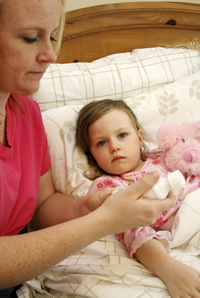Best In Science
Innovations in Medicine Safety

Medicines are used to heal, but they can sometimes cause harm when not used correctly. A recent CDC study has shown that adverse drug events cause more than 700,000 emergency department visits each year.
CDC partners with other federal agencies to measure, understand, and prevent harm from medicines, especially for the most vulnerable Americans—children and older adults. CDC, with the US Food and Drug Administration (FDA), joined together with the US Consumer Product Safety Commission to enhance the existing National Electronic Injury Surveillance System: Cooperative Adverse Drug Events Surveillance system (NEISS-CADES). This system tracks adverse drug events such as allergic reactions, side effects, and unintentional overdoses, supporting CDC’s efforts to protect people in every stage of life.
CDC’s innovation in national health monitoring using the NEISS-CADES system and collaborations with other federal agencies recently identified high rates of emergency visits for overdoses from cough and cold medicines among young children. FDA and the manufacturers of these products now recommend that these medicines should not be taken by children less than four years old. CDC and FDA are working together to ensure that parents and physicians are aware of these new recommendations which may prevent thousands of emergency department visits each year.
In 2008, CDC also used the NEISS-CADES system to find that just three drugs (insulin, warfarin, and digoxin) caused one in three emergency department visits related to medications among older adults. FDA, the Health Resources and Services Administration, and nongovernmental organizations are now using this information to focus and prioritize medication safety efforts to keep people healthy. CDC data also found that antibiotics were seven of the top 15 medicines implicated in emergency visits for adverse drug events. CDC has been working to reduce inappropriate use of antibiotics to address the emerging threat of antimicrobial resistance.
Hearing Initiative Triples Screening for Infants
Strong partnerships and collaborations with other federal agencies, states and territories, as well as several professional organizations are responsible for the remarkable success of CDC’s Early Hearing Detection and Intervention program. At the program’s inception, fewer than 30% of infants in the United States were being screened for hearing loss, compared to more than 92% today.
This program is a national initiative that supports the early identification of infant hearing loss through screening, audiological diagnosis, medical evaluation, and enrollment in early intervention services. More than 12,000 babies are born in the United States with hearing loss every year. Prior to this program, the average age of diagnosis of hearing loss in infants and young children ranged from 14 months to around three years of age. Now, many infants are diagnosed before three months of age. With screening and early intervention, estimates show a reduction of $44,220 per child in lifetime educational costs for children with permanent bilateral hearing loss—a potential savings of approximately $200 million annually.
Related Links
State of CDC
Contact Us:
- Centers for Disease Control and Prevention
1600 Clifton Rd
Atlanta, GA 30333 - 800-CDC-INFO
(800-232-4636)
TTY: (888) 232-6348
24 Hours/Every Day - cdcinfo@cdc.gov

